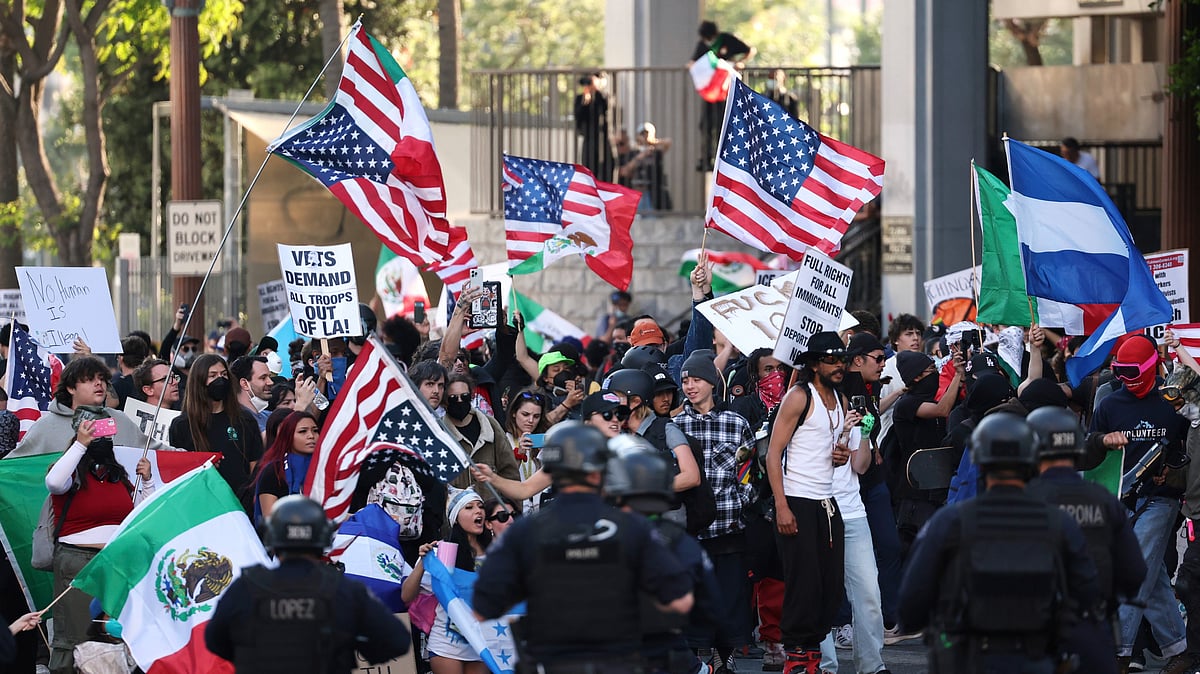I Attended UCLA’s Graduation Amid LA Protests. Here’s What I Actually Saw
The commencement ceremony at UCLA went off without the slightest hitch, writes Sumit Ganguly.

advertisement
This weekend, the University of California at Los Angeles (UCLA), the country’s premier state-funded university, held its annual commencement ceremony.
A close relative, who was coming going to accompany my wife and myself to my daughter’s graduation ceremony at UCLA, had expressed some misgivings on social media about attending the event, owing to the outbreak of violence in the city in response to President Donald Trump’s sweeping crackdown on undocumented aliens in the city.
Protests Were Largely Peaceful
Westwood, the area where the sprawling UCLA campus is located, is miles away from the location of the protests. More to the point, despite much perfervid reporting, especially on television channels, the protests were, for the most part, quite peaceful.
Some protestors, no doubt, resorted to violence. They threw rocks and other projectiles against Immigration and Customs Enforcement (ICE) agents and their vehicles. Others even went to the extent of setting commercial vehicles on fire. These acts were not only unconscionable but also criminal. Nevertheless, it needs to be underscored that they did not constitute the norm but were striking, if completely condemnable, exceptions.
What these violent protestors, however, failed to realise is that their isolated but feckless actions, which have come to loom large in much public consciousness, have done incalculable damage to their own cause. It has turned law-abiding citizens, who may well share their hostility toward the Trump administration’s draconian anti-immigrant sweeps, against them.
Why a Turn To Violence is Counterproductive
Beyond this ethical and moral concern, the turn to violence, especially in the current American political context, is also entirely counterproductive.
The crude, harsh and ham-handed actions of the Trump administration in its effort to forcibly deport any and all undocumented aliens is, without a doubt, morally reprehensible. Also, as several judicial rulings have highlighted, these actions may well deprive individuals of the constitutional right of due process. Consequently, vigorous but peaceful protests against these high-handed, and very possibly unconstitutional, actions is entirely appropriate.
The turn to violence to protest these policies is both morally dubious and legally untenable. However, what those who are engaging in violence do not seem to understand that even as a tactic of defiance it amounts to errant folly. The administration finds these violent protests to be entirely expedient; it can easily portray the protestors as not mere malcontents but actually dangerous and a threat to public order.
Thereby it facilitates a crackdown on such violent protests with increased vigor and force. Amongst its supporters who hold hardline, anti-immigrant views, such tough measures then feel entirely apt and justified. In turn, the violence on the streets solidifies political and electoral support for the administration and its unrelenting anti-immigrant policies.
Beyond these issues, the administration has also carefully targeted cities which are Democratic strongholds. Even though Democratic mayors, such as Karen Bass, in Los Angeles, have repeatedly stated that local law enforcement authorities are entirely capable of containing the protests, violent or otherwise, the administration has deliberately (and probably illegally federalised) the California National Guard.
The three-day commencement ceremonies at UCLA went off without the slightest hitch. The presence of the university police in public areas may have been a bit more conspicuous than usual.
However, I have no real basis for a meaningful comparison as I have not attended a commencement ceremony at a major university in some years. At any event, the university police maintained a respectful distance, did not appear intimidating or threatening, and politely directed us toward appropriate venues as necessary.
During our three-day stay in Los Angeles mostly in the areas of Brentwood, Westwood, Santa Monica, and Beverly Hills, we did not even encounter a whiff of the protests let alone witness a single act of political violence.
I took our daughter to two restaurants of her choice, along with my wife and in-laws. Apart from having to hunt for parking (a perennial problem in most large metropolitan areas), we encountered no other difficulties. The restaurants were crowded and at least one of them had a bit of a loud and raucous group of what appeared to be college students.
Misreporting By the Press
Sadly, in many parts of the country, especially in areas which are politically well-disposed toward the Trump administration, the press reports and the television coverage of the violent incidents in Los Angeles, loomed large. To them these small, isolated incidents seemed emblematic of what President Trump has been trumpeting: namely that Democratic-run cities are overrun with violent illegal immigrants and their unthinking supporters.
The administration, no doubt, will continue with these harsh tactics and continue to carefully target Democratic cities and towns. How the Democratic Party and elected officials handle the ensuing protests will test their political skills. At least one prominent and outspoken Democratic senator, Chris Murphy of Connecticut, has spelled out the outlines of a strategy.
It calls for support for all forms of legitimate, peaceful protest while firmly and unequivocally condemning any turn to violence. It remains to be seen if his colleagues both within the party as well in the House and the Senate heed his sage counsel. Unless all forms of violent protest are promptly reined in, entirely reasonable demands for an end to the high-handedness of this administration could easily backfire in the worst way for the Democratic Party.
(Sumit Ganguly is a Senior Fellow and directs the Huntington Program on Strengthening US-India Relations at the Hoover Institution at Stanford University. This is an opinion piece. The views expressed above are the author’s own. The Quint neither endorses nor is responsible for them.)